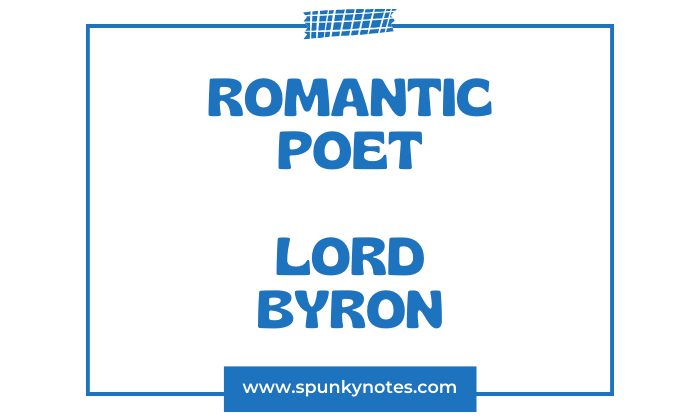

Estimated Reading Time: 6 min
Q. Discuss Lord Byron as a romantic poet.
Lord Byron is recognized as a significant figure in the second generation of Romantic poets. His poetry often features themes of love, freedom, and adventure, reflecting the Romantic era’s values.
Byron’s personal life and flamboyant public image also influenced his works, infusing them with a sense of rebellion against social norms and conventions.
Lord Byron as a Romantic Poet
Lord Byron’s works often reflect his tumultuous life and genuine passion for personal freedom. The following characteristics mark him as a Romantic poet.
- Individualism and Rebellion
- Intensity of Emotions
- Appreciation of Nature
- Philosophical Reflection
- Defiance of Conventional Morality
1- Individualism and Rebellion
Lord Byron’s poetry highlights individualism and rebellion, defining the Romantic movement. His protagonists typically resist societal norms and seek personal freedom.
In “Childe Harold’s Pilgrimage,” Byron introduces Harold, a character who leaves the constraints of conventional society to seek meaning through travel and personal reflection:
Not in those climes where I have late been straying,
Though Beauty long hath there been matchless deemed,
Not in those visions to the heart displaying
Forms which it sighs but to have only dreamed.
This passage highlights Harold’s desire to escape the familiar and find more profound significance beyond the societal expectations he encounters.
Another example is in “Manfred,” where the titular character defies not only societal norms but also supernatural powers, reflecting a profound assertion of individual will:
There is an order
Of mortals on the earth who do become
Old in their youth, and die ere middle age,
Without the violence of warlike death.
Manfred’s character illustrates a struggle for personal autonomy against external forces and societal rules, showcasing Byron’s fascination with the rebel as a central theme in his work.
2- Intensity of Emotions
Lord Byron’s poetry often shows strong feelings, a vital part of his style as a Romantic poet. In the poem “She Walks in Beauty,” Byron expresses a deep sense of admiration and wonder:
She walks in beauty, like the night
Of cloudless climes and starry skies;
And all that’s best of dark and bright
Meet in her aspect and her eyes.
This shows how beauty deeply moves the speaker, combining feelings of awe and attraction.
In another work, “Don Juan,” Byron portrays a mix of feelings, including sadness and regret.
And then he thought on his first love, and then
He thought on her who should have been his bride,
Thought on the past, till past became a pain.
It reflects the character’s deep sadness and longing for what he has lost. Byron’s ability to express such powerful emotions reflects typical characteristics of Romantic literature that focus on personal feelings.
3- Appreciation of Nature
Lord Byron’s poetry often highlights his profound appreciation for nature, reflecting the Romantic movement’s emphasis on the beauty and power of the natural world. His descriptions of landscapes are not only striking but also filled with emotion, illustrating how deeply nature impacts him.
In “Childe Harold’s Pilgrimage,” Byron writes about the historical and majestic landscapes of Greece, linking the beauty of the land to the spirit of freedom:
The mountains look on Marathon
And Marathon looks on the sea;
And musing there an hour alone,
I dreamed that Greece might still be free.
These lines not only describe the scenery but also connect it emotionally to themes of liberty and heroism.
In “Don Juan,” Byron turns to the ocean to express nature’s vast and uncontrollable power:
Roll on, thou deep and dark blue Ocean—roll
Ten thousand fleets sweep over thee in vain;
Man marks the earth with ruin—his control
Stops with the shore.
Here, Byron contrasts the enduring, untamed force of the ocean with human frailty and the limits of human influence. Through these examples, Byron uses the natural world to convey feelings of awe and reflect on human existence.
4- Philosophical Reflection
Lord Byron’s poetry often includes deep reflections on life and the human condition, using simple and direct language to discuss profound themes.
In “Childe Harold’s Pilgrimage,” Byron reflects on the temporary nature of human achievements and experiences:
And the clouds perish; Fortune’s fickle gale
Blows hither and thither, and the mists disperse
For ever fading, never more to be.
This passage considers how quickly human successes can disappear, highlighting the impermanence of life’s triumphs.
Another example is from “The Prisoner of Chillon,” where Byron speaks about the enduring nature of the human spirit, even under challenging circumstances:
Eternal Spirit of the chainless Mind!
Brightest in dungeons, Liberty! thou art,
For there thy habitation is the heart
The heart which love of thee alone can bind.
Here, Byron admires the strength of the human spirit and its capacity to remain free in spirit, even when physically confined. These poems show Byron’s ability to weave philosophical considerations about freedom, fate, and the human spirit into his work.
5- Defiance of Conventional Morality
Lord Byron’s poetry is well-known for challenging the conventional morality of his era, a theme vividly portrayed in his works’ characterizations and scenarios.
In “Don Juan,” Byron satirizes the strict moral codes of his society by presenting the adventures of his protagonist, who engages in behaviors that starkly contrast with the expected norms:
Juan was but a timid swain
All down the Seville to Cadiz bay
His conduct might make his mother grey.
In this passage, Byron humorously notes that Don Juan’s actions, which deviate from societal expectations, would be shocking to conventional sensibilities, particularly those of a parent.
Additionally, Byron critiques the hypocrisy of society’s elites in “Don Juan” with sharp irony:
What men call gallantry, and gods adultery,
Is much more common where the climate’s sultry.
Byron uses these lines to comment on the double standards in moral judgments, depending on social status and context.
Conclusion
His bold critique of social and moral hypocrisy reflects his defiance of the conventional morality of his time, showcasing his characteristic boldness and irreverence in addressing societal norms.
Lord Byron’s poetry reflects the Romantic movement by focusing on intense emotions and individualism. His works often challenge societal norms, expressing a rebellious spirit that aligns with Romantic ideals.
He also shows a deep appreciation for nature, another key element of Romanticism. Byron’s personal life, filled with adventure and controversy, mirrors the traits of a Romantic hero.
His commitment to expressing personal and universal truths makes him a defining figure of the Romantic era. Through his poetry, Byron not only embraced but also helped shape the principles of Romanticism.


